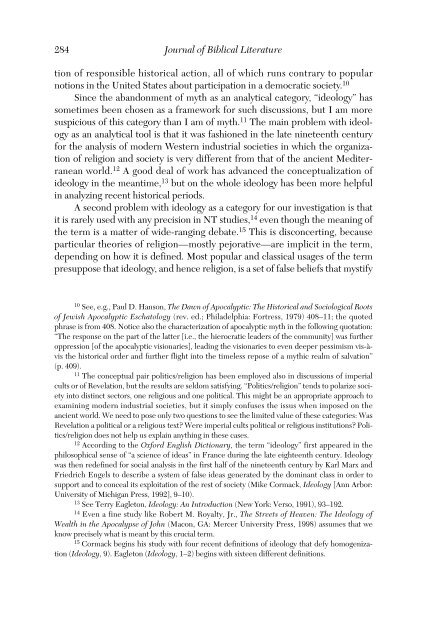Journal of Biblical Literature - Society of Biblical Literature
Journal of Biblical Literature - Society of Biblical Literature
Journal of Biblical Literature - Society of Biblical Literature
Create successful ePaper yourself
Turn your PDF publications into a flip-book with our unique Google optimized e-Paper software.
284<br />
<strong>Journal</strong> <strong>of</strong> <strong>Biblical</strong> <strong>Literature</strong><br />
tion <strong>of</strong> responsible historical action, all <strong>of</strong> which runs contrary to popular<br />
notions in the United States about participation in a democratic society. 10<br />
Since the abandonment <strong>of</strong> myth as an analytical category, “ideology” has<br />
sometimes been chosen as a framework for such discussions, but I am more<br />
suspicious <strong>of</strong> this category than I am <strong>of</strong> myth. 11 The main problem with ideology<br />
as an analytical tool is that it was fashioned in the late nineteenth century<br />
for the analysis <strong>of</strong> modern Western industrial societies in which the organization<br />
<strong>of</strong> religion and society is very different from that <strong>of</strong> the ancient Mediterranean<br />
world. 12 A good deal <strong>of</strong> work has advanced the conceptualization <strong>of</strong><br />
ideology in the meantime, 13 but on the whole ideology has been more helpful<br />
in analyzing recent historical periods.<br />
A second problem with ideology as a category for our investigation is that<br />
it is rarely used with any precision in NT studies, 14 even though the meaning <strong>of</strong><br />
the term is a matter <strong>of</strong> wide-ranging debate. 15 This is disconcerting, because<br />
particular theories <strong>of</strong> religion—mostly pejorative—are implicit in the term,<br />
depending on how it is defined. Most popular and classical usages <strong>of</strong> the term<br />
presuppose that ideology, and hence religion, is a set <strong>of</strong> false beliefs that mystify<br />
10 See, e.g., Paul D. Hanson, The Dawn <strong>of</strong> Apocalyptic: The Historical and Sociological Roots<br />
<strong>of</strong> Jewish Apocalyptic Eschatology (rev. ed.; Philadelphia: Fortress, 1979) 408–11; the quoted<br />
phrase is from 408. Notice also the characterization <strong>of</strong> apocalyptic myth in the following quotation:<br />
“The response on the part <strong>of</strong> the latter [i.e., the hierocratic leaders <strong>of</strong> the community] was further<br />
oppression [<strong>of</strong> the apocalyptic visionaries], leading the visionaries to even deeper pessimism vis-àvis<br />
the historical order and further flight into the timeless repose <strong>of</strong> a mythic realm <strong>of</strong> salvation”<br />
(p. 409).<br />
11 The conceptual pair politics/religion has been employed also in discussions <strong>of</strong> imperial<br />
cults or <strong>of</strong> Revelation, but the results are seldom satisfying. “Politics/religion” tends to polarize society<br />
into distinct sectors, one religious and one political. This might be an appropriate approach to<br />
examining modern industrial societies, but it simply confuses the issus when imposed on the<br />
ancient world. We need to pose only two questions to see the limited value <strong>of</strong> these categories: Was<br />
Revelation a political or a religious text? Were imperial cults political or religious institutions? Politics/religion<br />
does not help us explain anything in these cases.<br />
12 According to the Oxford English Dictionary, the term “ideology” first appeared in the<br />
philosophical sense <strong>of</strong> “a science <strong>of</strong> ideas” in France during the late eighteenth century. Ideology<br />
was then redefined for social analysis in the first half <strong>of</strong> the nineteenth century by Karl Marx and<br />
Friedrich Engels to describe a system <strong>of</strong> false ideas generated by the dominant class in order to<br />
support and to conceal its exploitation <strong>of</strong> the rest <strong>of</strong> society (Mike Cormack, Ideology [Ann Arbor:<br />
University <strong>of</strong> Michigan Press, 1992], 9–10).<br />
13 See Terry Eagleton, Ideology: An Introduction (New York: Verso, 1991), 93–192.<br />
14 Even a fine study like Robert M. Royalty, Jr., The Streets <strong>of</strong> Heaven: The Ideology <strong>of</strong><br />
Wealth in the Apocalypse <strong>of</strong> John (Macon, GA: Mercer University Press, 1998) assumes that we<br />
know precisely what is meant by this crucial term.<br />
15 Cormack begins his study with four recent definitions <strong>of</strong> ideology that defy homogenization<br />
(Ideology, 9). Eagleton (Ideology, 1–2) begins with sixteen different definitions.

















